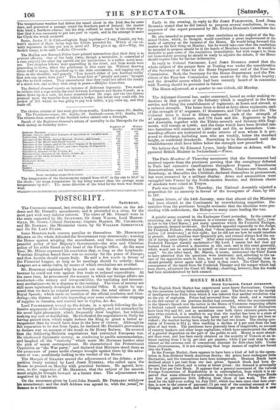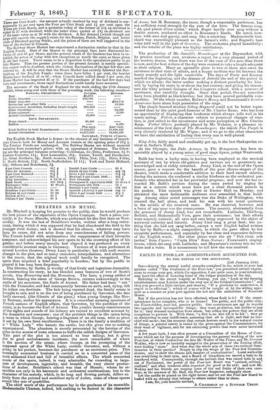MONEY MARKET.
STOCK Exegeses, FAWAT AFTERNOON.
The English Stock Market has experienced some heavy fluctuations; Consols on two occasions having fallen suddenly 1 per cent. The first was on the receipt of intelligence from Paris from which it was inferred that another revolution was on the eve of explosion. Prices had recovered from this shock, and a reaction to the full extent of the previous decline had occurred, when the announcement in the Queen's Speech and the notice in the House of Commons respecting affairs in Ireland caused another downward movement. The extremes of fluctuation have been 901 and 92; and as quotations near both these extreme points have been twice reached, it is needless to say that the market has been in a state of activity. The movements during the latter part of this day have not been so violent ; the market having been steady for the last two hours. The closing quo- tation of Consols is 91i i; thus marking a decline of # per cent from the last price of last week. The purchases have generally been of magnitude, on account of country bankers and other large capitalists; which have counteracted the effect of a general disposition on the part of the public to sell. Money is more abund- ant than ever, and has been easily obtained on the security of Consols at an in- terest varying from 1 to 1 per cent per annum; while 2 per cent may be con- sidered as the extreme rate of commercial discount for first-class bills. Under these circumstances, it is not surprising that large masses of capital are forced into the Funds.
In the Foreign Market, there appears to have been a kind of lull in the specu- lation in Non-dividend South American Stocks: the prices have undergone little fluctuation, and the transactions have been unimportant. Mexican Bonds have declined about 1 per cent from our last prices. Spanish Stock had been de- pressed, but has rallied, and is today at better prices: the demand is principally for the Five per Cent Stock. It appears that a general movement of the various Foreign Committees of Bondholders is in contemplation, from which it is ex- pected that some aliment for speculation may be extracted. Portuguese Bonds are firm at quotations little differing from those of last week. The divi- dend for the half-year ending 1st July1847, which has been since that date over- due, is now in the course of payment; 75 per cent of the nominal amount of the Coupon being paid in cash, and the remaining 25 per cent in Bonds of a nen
Three per Cent Stock: the amount actually received by way of dividend is con- ti per cent upon the Four per Cent Stock and lb per cent upon the sequently Three per Cent Bonds, and a quotation today of the former at 25b ex-dividend is equal to 27 with dividend, while the latter when quoted at 24-& ex-dividend are of the same value as at 26 with the dividend. A fair demand (which though not large still exceeds the supply) exists for the Russian, Dutch, Belgian, and better class of Dividend-paying Stocks, and the prices of them are well supported in the face of the decline to Consols. The Railway Share Market has experienced a fluctuation similar to that in the English Funds. Most of the Shares in the principal lines have fluctuated be- tween 51. and 61. per Share, and the general result of the business has been to es- tablish the prices of today with few exceptions as nearly the same as those given in our last report. There seems to be a disposition in the speculative public to go into Shares. That the greater portion of the present demand is merely specula- tive cannot well be doubted, when the violent fluctuations of the last few days are referred to. It will be seen that the Share Market has entirely followed the fluc- tuations of the English Funds: when these have fallen 1 per cent, the heavier Shares have declined 51. or 6/.; when Consols have rallied about 1 per cent, the Share Market has improved 4/. or Si. if the purchases of the last few days had been real investments, these rapid fluctuations could hardly have occurred.
The accounts of the Bank of England for the week ending the 27th January exhibit, when compared with those of the preceding week, the following results-
BARTKINki DEPARTMENT. Increase. Decrease.
Rest -
Public Deposits X6,675 206,508
-
—
Other DePvgN3
X84,718 Seven-day and other Bills
18,288 Government Securities, including Dead-weight 260,313 — Other securities
99,566 Notes unissued
3,595
Actual Circulation
99,090
-
ISSUE DEPARTMENT.
Notes issued
45,495
45— Bullion
6,480
This week. Last week.
Total Bullion in both Departments
,042071
15,042,071
, 15,048,551 Actual Circulation 18,677,525 18,628,435
SATURDAY, TWELVE O'CLOCK.
The English Stock Market is firmer: in the absence of any business of import- ance Consuls both for Money and Account remain at the opening price of 91e b. The Foreign Funds are unchanged. The Railway Shares are without material variation from yesterday's prices; with an appearance of firmness. The follow- ing are the principal bargains occurring: Caledonian, 25; Ditto, Preference, 8b 9;
Eastern Counties, 11b; East Lancashire, 201; Exeter, New, and Dorchester, 41 Great Northern, 9b; North-western, 136b; Ditto, New, 121; Ditto, Fifths, 9; North British, 17k; North Staffordshire, 12 111; York and North Midland, 581; Orleans and Bourdeaux, 21.
3 per Cent Consols Ditto for Account 3 per Cent Reduced 31 per Cents Long Annuities 911 1 911 1 911 g 921 1 8 15-16 9 Danish 3 per Cents ' Dutch 21 per Cents Ditto 4 per Cents • Mexican 5 per Cents 1846— • New Grenada 65 8 481 91 771 81 254 15 16 Bank Stock 193 1951 PortugueseN. 4 perCents1842 25 26 ex d Exchequer Bills 42 49 pm. Portuguese Old 1824 73 5 India Stock
Russian 5 per Cents 104 106 Brazilian 5 per Cents 78 80 Spanish (Active) b per Cents 141 15 Belgian 41 per Cents 78 80 Ditto 3 per Cents 1842 271 8 Buenos Ayres 25 7 Venezuela 19 21 Chillan 6 per Cents
91 3



























 Previous page
Previous page